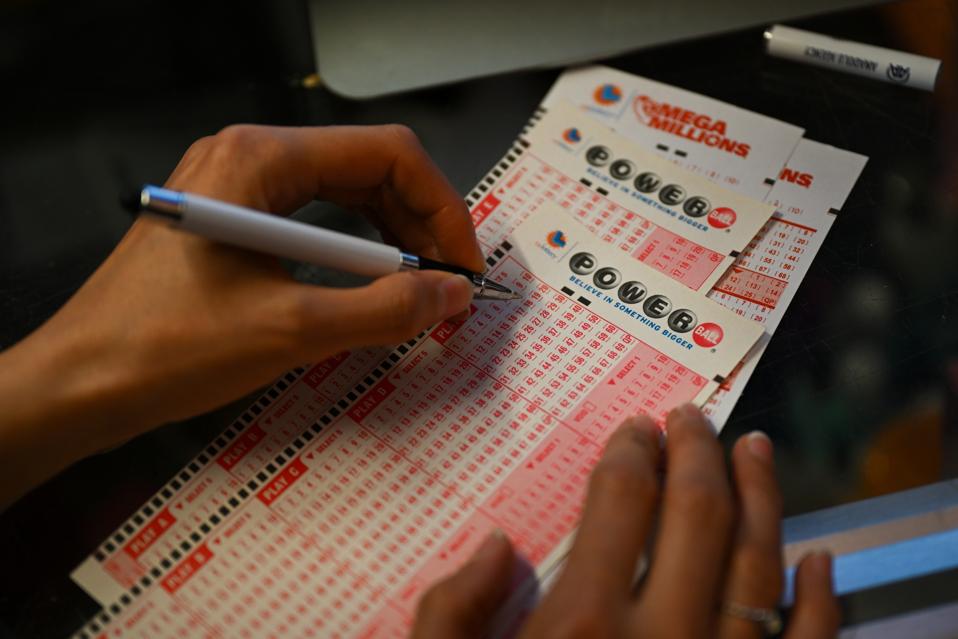Is Powerball equitable?
On Wednesday night, millions of Americans tuned into Powerball.com to watch the winning numbers get drawn – 9-12-22-41-61-25. Many of whom had their eyes on an estimated $850 million jackpot.
The sheer size of that number is staggering for a $2 ticket price, and it’s by design. Huge lottery winnings spark excitement, and a flurry of buyers hoping to have a small, albeit very small, chance at winning.
There was no jackpot winner on Aug 27, pushing the Aug 30 drawing to (likely) exceed $1 billion, it is now at $950 million.
But the reality behind the jackpot number paints a far more complicated and somewhat unfair picture for the winner. By the time federal and state taxes are applied, if you choose the lump sum payout—the option most winners prefer— your take-home on $850 million shrinks to roughly $242 million (depending on the state you live in, etc.). While still a life-changing number, the gap of $600+ million between the advertised jackpot and the actual cash in hand raises an important question: is Powerball truly equitable, or is it a system built on illusion and inequality?
Jackpot Vs. Reality
$850 million represents unimaginable wealth. But the full amount of the jackpot is available only as an annuity paid out over 30 years. That means roughly $27.2 million annually—before taxes. (It increases 5% annually each so the value will vary)
With that being the case, most winners select the lump sum option on their tickets, which comes out to $384 million before taxes. From there, a 24% mandatory federal tax withholding is subtracted, cutting the price to $279.6 million. If the winner falls into the top federal tax bracket of 37%—which they almost certainly will—another tax is taken, reducing the total to around $231.8 million. Then, depending on the state of the winner’s residence, more money will be deducted due to local taxes. For example, a winner from New York could face an additional 10.9% state tax, while someone in Florida or Texas would be able to avoid the state taxes entirely.
Is it equitable or fair that a $850 million prize is closer to $242 million? I’m not so sure, that is a big difference. Still transformative, yes—but far from the advertised jackpot.
The next Powerball inequity lies in its odds: one in 292.2 million. Even Mega Millions, often considered the “tougher” lottery to win, has been adjusted to have slightly better odds: one in 290.4 million.
While lotteries clearly highlight the winners and winning, the system is funded and supported almost entirely by those who lose — players who may spend hundreds, even thousands of dollars over the years chasing a nearly impossible outcome. The dream of having limitless wealth sustains Powerball sales, but the statistical reality of losing keeps the jackpots growing.
Who Really Benefits?
Powerball is marketed as a public good, as ticket sales fund education, infrastructure, or social programs, depending on the state lottery rules. While states collectively receive billions in revenue, social critics argue that lotteries disproportionately rely on lower-income players, who spend a larger share of their income on tickets. When they don’t win, there are real-life consequences of survival.
This squarely puts equity into play: do lotteries uplift communities by redistributing wealth toward social services, or are they extracting the limited resources from the very people who can least afford to lose them? Academic studies repeatedly show that lottery participation skews toward lower-income, less-educated, and ethnic minority populations. For many, Powerball is much less a form of low-entry entertainment; rather, it’s a long-shot investment strategy.
Powerball jackpots create a shared fantasy. The communal anticipation—office pools, gas station lines, group chats about “what would you do if you won”—brings people together, especially when jackpots get this large.
In fiscal year 2024, three jackpots crossed the billion-dollar threshold. By comparison, 2025 has produced only one so far, and a second is likely after no one won this Aug 27 $850 million prize.
Is Powerball Equitable?
That answer depends on how you define fairness. From one perspective, everyone who buys a ticket faces the same odds. The cost—just $2—is relatively low, the rules and drawing are transparent, the process is regulated, and the payout, though reduced by taxes, is guaranteed.
But equity also demands an equal burden, and by that measure, the lottery falls short as it is disproportionately funded by those with the least disposable income.
The truth is, Powerball reflects a paradox. It promises a chance at upward mobility but delivers only to an infinitesimal few. For everyone else, it extracts money while feeding dreams of escaping reality. In an era where wealth gaps are widening and financial insecurity is high, the lottery acts both as a coping mechanism and as a reminder of how distant real financial security feels.
If the next Powerball pushes past $1 billion, a lump sum winner will take home an estimated $343 million, after taxes, once the final jackpot is revealed.
With tickets being sold in 45 states, Puerto Rico, and the U.S. Virgin Islands, the game has already won America over.
But beneath the glittering headlines lies the uncomfortable truth: the advertised jackpot is not the real prize, the odds are stacked against players, and the system relies heavily on the very people most vulnerable to financial strain.
Is Powerball selling hope, or is it quietly perpetuating inequity?
I’d much rather answer that question after taking home the jackpot, but until then, I’ll take a few more quick picks for next week’s drawing.

